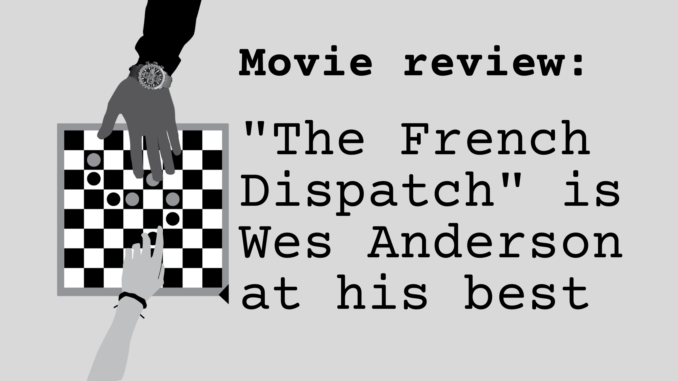
After facing delays from COVID-19, director Wes Anderson released “The French Dispatch” to theaters during late 2021. Like many of Anderson’s films, “The French Dispatch” is a freewheeling journey through a deeply niche world, in this case, the world of features journalism. To the same degree, the film is so charmingly witty and rambunctious that one can’t help but duck and dive through each of its narrative turns.
Set at the titular news firm — an outpost of an American newspaper based in Liberty, Kansas — “The French Dispatch” follows three journalists as they interview their subjects and write stories. The first story is a tale of modern art and greed from the perspective of a clinically insane painter. The second is a tale of rebellion at a private university from the perspective of its young revolutionaries. The third is a tale of abduction and intrigue from the perspective of a criminal investigator and his son. Interweaving these stories are moments shared by French Dispatch editor-in-chief Arthur Howitzer Jr. and the journalists themselves as they write and edit.
One will immediately notice what has become typical of Anderson’s body of work: an eye for detail unlike any other director. The sets and settings of “The French Dispatch” are diverse, quaint and carefully constructed to immerse the viewer in each scene. Fictional French town Ennui-sur-Blasé comes alive under Anderson’s style, as do the locales of each story — a drab penitentiary, a lively college campus and the streets and alleyways of a city at night.
The writing on display is quick, funny and injected with the delightfully deadpan wit of other Anderson vehicles. The humor is dry and plentiful. Rarely does the script miss a beat, and when it does, the whole thing chugs on without pause.
The cinematography and framing are likewise commendable. Director of photography Robert Yeoman presents remarkable interior and exterior shots. Scenes of color mix with scenes of monochrome depending on when each one takes place, the transition between the two natural and necessary. One chase scene is delightfully animated, contributing to its slapstick nature. Anderson’s signature style of symmetrical framing coupled with his tracking shots — while not everyone’s cup of tea — adds to the film’s overall penchant for peculiarity.
“The French Dispatch” is a star-studded film, featuring several big-name actors in each of its segments. Tilda Swinton, Frances McDormand and Jeffrey Wright make up the three main journalists, J.K.L. Berensen, Lucinda Krementz and Roebuck Wright, respectively. Swinton occupies Berensen’s overwhelming nature expertly, setting her apart from the calm characters Swinton usually plays. McDormand as Krementz is as blunt as ever, playing to the actor’s strengths. Finally, Jeffrey Wright as Roebuck Wright performs the dialogue-heavy character with all the grace expected of such a respected actor. Benicio del Toro, Adrien Brody and Timothée Chalamet likewise impress.
Ultimately, “The French Dispatch” exists in much the same manner as Anderson’s past ventures: as a love letter to one small pocket of the world. It is a story about storytellers, one that exemplifies a labor of love on the part of cast and crew, showcasing some of Anderson’s best and most intimate work. In the same way that “The French Dispatch” is a love letter to journalists, Anderson’s regard for no-nonsense, punchy storytelling bespeaks a love for the film industry. 4.5/5
